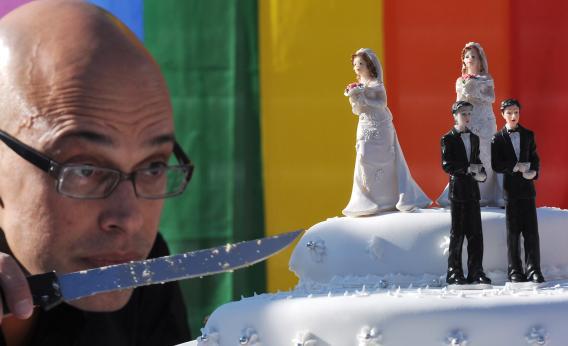Residents in four states will head to the polls on Tuesday to have their say on whether same-sex marriage should be legal, giving gay rights advocates and their allies a prime opportunity to snap an 0-for-32 losing streak at the ballot box.
Voters in Maryland, Maine, and Washington state will decide whether to approve ballot initiatives that would make it legal for gays and lesbians to walk down the aisle. Meanwhile, in Minnesota, where same-sex marriage is already illegal, voters will decide whether to use a state constitutional amendment to cement that existing ban.
It’s difficult to accurately gauge each referendum’s respective chance of passage, in part because statewide polling can often be somewhat spotty (thanks to sample sizes and methodologies) and because attitudes toward gay rights have proved to be difficult to poll in the past. But the numbers that are available suggest that gay-marriage backers appear likely to finally earn at least one state referendum win on Tuesday, something that would represent the latest major milestone for the movement. It is even conceiveable that by the time the final votes are counted, the LGBT crowd could be on their own full-fledged winning streak.
Here’s a quick rundown of where things stand according to the most recent polling:
Maine: A Critical Insights survey from late September suggested support that was almost too good to be true for gay rights advocates: 57 percent in favor, 36 percent against, and 7 percent undecided, good for a 21-point lead. While CI’s most recent survey suggests that conservatives have closed the gap somewhat, the measure still remains on track for approval. The latest numbers, released Sunday, show 55 percent of likely voters in favor and 42 percent against, good for a 13-point lead.
Maryland: A Washington Post poll from the middle of October showed gay-marriage backers with a 9-point lead, 52 percent to 43. But more recent polling conducted by the Baltimore Sun at the end of the month shows an even split. As the New York Times explains, part of the reason for the shift may have to do with the wording used by the Sun’s pollsters. That said, an earlier Sun poll showed the gay marriage referendum with a 10-point lead, suggesting that the race has tightened considerably coming down the home stretch.
Minnesota: A pair of polls released last Tuesday show that the gay-marriage-banning amendment leads by 1 percent, well within the margin of error. A new poll from Democratic-leading Public Policy Polling released late Saturday paints a different picture, however, with 52 percent of likely voters saying they oppose the proposed constitutional amendment compared to 45 percent who said they support it. A PPP survey from the beginning of October showed a much tighter race.
Washington: A poll from the University of Washington’s Center for Survey Research from the first half of October shows gay marriage support in the double digits, 56 percent to 36 among registered voters and 54 percent to 38 percent among likely voters.
Gay rights advocates have been on something of a judicial and state legislative hot streak of late, but they have so far been unable to post a victory in a voter referendum on the issue. Since 1998, voters have gone to the polls 32 times to cast ballots on statewide measures on the issue; advocates for same-sex marriage have lost every time, most recently in North Carolina in May of this year when voters approved a state constitutional amendment banning same-sex marriages and civil unions.
Tuesday marks the first time that voters will weigh in on the issue since President Obama endorsed same-sex marriage.
The issue of gay marriage is also indirectly on the ballot in a fifth state, Iowa, where the state’s Supreme Court struck down the state’s ban on gay marriage in a 7-0 ruling back in 2009. One of those judges, Justice David S. Wiggins, finds his name on the ballot this year for a retention election the judges (who are appointed, not elected) face periodically. As the Washington Post points out, Christian conservatives mounted a campaign in 2010 that ousted three of Wiggins’ fellow justices and likewise hope to end Wiggins’ time on the state’s high court this time around.
